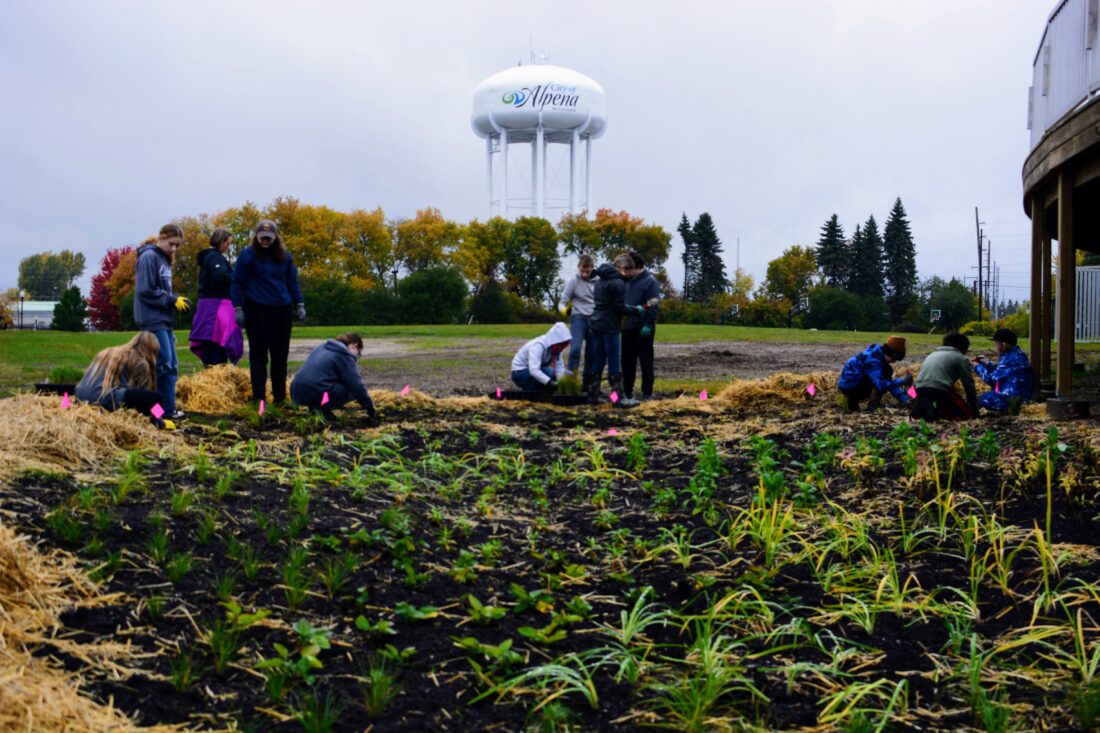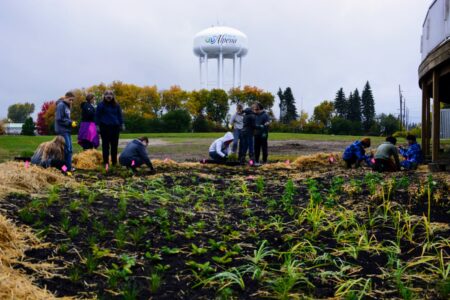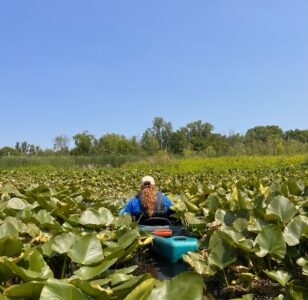New native plant gardens, dune restoration in Alpena

Courtesy Photo In 2023, students are seen installing native plants in a rain garden along the Bi-Path near Alpena’s NOAA building. According to Huron Pines, this rain garden is designed to capture and filter thousands of gallons of stormwater annually.
ALPENA — Construction on two native plant gardens at Bay View Park, and the continuation of the dune restoration project at Mich-e-ke-wis Park, will start this month, according to Huron Pines.
The projects are supported by the partnership between Huron Pines and the City of Alpena to address stormwater runoff, improve natural habitats, and protect the water quality of Lake Huron, a Huron Pines press release stated.
From community input online and from a green stormwater infrastructure workshop in Alpena in October 2022, the dune restoration and rain garden projects were the top-favored proposals.
City Manager Rachel Smolinski said in the release that the garden and dune restoration projects represent Alpena’s commitment to conservation and Lake Huron Forever pledge.
“The rain garden and pollinator garden at Bay View Park and the dune restoration extension at Mich-e-ke-wis are not just isolated projects — they are highly visible, practical demonstrations of Alpena’s commitment to sustainable stormwater management, resilient parks, and long-term protection of Lake Huron as pledged in the City’s Lake Huron Forever roadmap,” Smolinski said.
According to Huron Pines, stormwater is rainfall and snowmelt that flows over streets, parking lots, and other hard surfaces. Stormwater carries pollutants into storm drains which empty into Lake Huron.
“In Alpena, pollutants like excess fertilizer, animal waste, and litter harm the water quality of Thunder Bay — the source of the City’s drinking water — and can result in beach closures, algae blooms, and impact fish and wildlife,” the release states.
According to Huron Pines, the rain garden will require excavating a few feet at the site and backfill with layers of rock and pea gravel. The area will be topped with topsoil and volunteers will plant a mix of native flowering plants.
Steve Shultz, City of Alpena engineer, told The News that the city’s DPW staff will do most of the excavation work and Huron Pines will take care of the planting.
Amy Nowakowski, Huron Pines senior project manager, told The News that Huron Pines wants the community to take part in creating the rain gardens and protect the water quality of Northeast Michigan.
“We really wanted to get the community involved too,” Nowakowski said. “Between the three projects … we are protecting Lake Huron.”
According to the release, financial assistance for this project was provided to the City of Alpena by the Michigan Coastal Management Program, Water Resources Division, and EGLE, with funding provided through the NOAA National Coastal Zone Management Program.
The public can help Huron Pines staff plant the gardens at Bay View Park on Oct. 14, with a rain date of Oct. 16. Volunteers can sign up now at huronpines.org/events.
RAIN GARDEN PROJECTS
Huron Pines explains that rain gardens are an example of “green stormwater infrastructure.” According to the nonprofit, these examples of infrastructure use a combination of stone, soil, and deep-rooted native plants to catch and filter stormwater runoff.
“In Alpena, rain gardens can reduce the load on underground storm sewers, prolonging the life of these systems, and contribute to cleaner drinking water,” the release states.
Other examples of rain gardens can be found along the Bi-Path at the Great Lakes Maritime Heritage Center in Alpena and along Michigan Avenue in Rogers City.
The rain garden will cover 1,000 square feet in a low area of Bay View Park, according to the release. In this low area, water pools after heavy rains or when waves crash over the rock breakwall.
“Areas that are naturally wet are the ideal place for a rain garden and that’s why this location was chosen,” Nowakowski said in the release.
Nowakowski added that standing water has made the site difficult for DPW staff to mow.
“The garden will have plants that bloom throughout the growing season so it can be enjoyed by people and pollinators alike,” Nowakowski said in the release.
Another 6,000 square feet of the park will be converted to a pollinator garden, providing habitat for birds and insects. The garden will also serve as a community showpiece of native landscaping.
According to Nowakowski, the gardens will initially require some watering and weeding until they become established and are self-seeding. She stated this will likely take two growing seasons.
DUNE RESTORATION PROJECT
Huron Pines describes dunes as long, raised areas of dry sand and plants running parallel to shorelines. Dunes store sand and replenish beaches, protect coastal areas from erosion during high water years, and serve as habitat for native plants, birds and small wildlife.
Huron Pines states that examples of healthy dune ecosystems can be found at Besser Natural Area, Negwegon State Park, and Ossineke State Forest Campground.
“Sand fencing installed at Mich-e-ke-wis Park in 2023 is having the intended effect of catching sand and forming dunes, and native plants have helped stabilize the sand,” the release states. “This project will be extended this fall along more of the beachfront, further restoring the landscape and making a shoreline that’s more resilient to erosion from wind and waves.”
Nowakowski told The News that the sand fencing has been successful thus far in catching windblown sand. She said Huron Pines will extend the sand fencing starting from the south end of the current fencing.
“I love this project because you can see it working almost in real time,” Nowakowski said. “It’s already helping to restore this park, and extending the project will increase those benefits and make the park easier and less costly for the City to maintain.”
Kayla Wikaryasz can be reached at 989-358-5688 or kwikaryasz@TheAlpenaNews.com.





